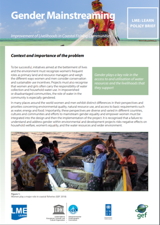 Gender Mainstreaming: Improvement of Livelihoods in Coastal Fishing Communities
Gender Mainstreaming: Improvement of Livelihoods in Coastal Fishing Communities
To be successful, initiatives aimed at the betterment of lives and the environment must recognize women’s frequent roles as primary land and resource managers and weigh the different ways women and...
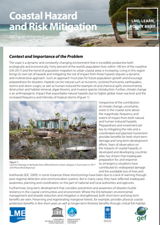 Coastal Hazard and Risk Mitigation: Taking an integrated approach to protect people and places
Coastal Hazard and Risk Mitigation: Taking an integrated approach to protect people and places
Forty percent of the world’s population lives within 100 km of the coastline (UN 2017) and the trend of population migration to urban coastal areas is increasing. Living in this region brings its o...
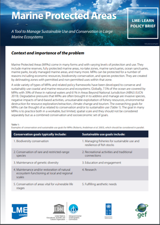 Marine Protected Areas: A tool to manage sustainable use and conservation in Large Marine Ecosystems
Marine Protected Areas: A tool to manage sustainable use and conservation in Large Marine Ecosystems
Marine Protected Areas (MPAs) come in many forms and with varying levels of protection and use. They include marine reserves, fully protected marine areas, no-take zones, marine sanctuaries, ocean ...
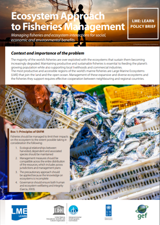 Ecosystem Approach to Fisheries Management: Managing fisheries and ecosystem interactions for social, economic and environmental benefits
Ecosystem Approach to Fisheries Management: Managing fisheries and ecosystem interactions for social, economic and environmental benefits
The majority of the world’s fisheries are over exploited with the ecosystems that sustain them becoming increasingly degraded. Maintaining productive and sustainable fisheries is essential to feedi...
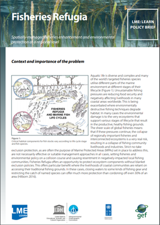 Fisheries Refugia: Spatially-managed fisheries enhancement and environmental protection at a regional level
Fisheries Refugia: Spatially-managed fisheries enhancement and environmental protection at a regional level
A Fisheries Refugia approach is a regional system of management areas that is focused on essential links between fish stocks and their habitats. It is designed to manage intense levels of small-sca...
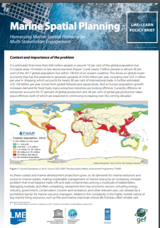 Marine Spatial Planning: Harnessing Marine Spatial Planning for Multi-Stakeholder Engagement
Marine Spatial Planning: Harnessing Marine Spatial Planning for Multi-Stakeholder Engagement
The Intergovernmental Oceanographic Commission of UNESCO defines Marine Spatial Planning (MSP) as a process of analyzing and allocating the spatial and temporal distribution of human activities in ...
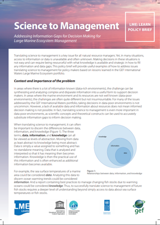 Science to Management: Addressing Information Gaps for Decision Making for Large Marine Ecosystem Management
Science to Management: Addressing Information Gaps for Decision Making for Large Marine Ecosystem Management
Translating science to management is a key issue for all natural resource managers. Yet, in many situations, access to information or data is unavailable and often unknown. Making decisions in thes...
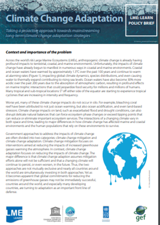 Climate Change Adaptation: Taking a proactive approach towards mainstreaming long-term climate change adaptation strategies
Climate Change Adaptation: Taking a proactive approach towards mainstreaming long-term climate change adaptation strategies
Across the world’s 66 Large Marine Ecosystems (LMEs), anthropogenic climate change is already having profound impacts to terrestrial, coastal, and marine environments. Unfortunately, the impacts of...
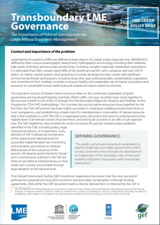 Transboundary LME Governance: The Importance of Political Commitment for Large Marine Ecosystem Management
Transboundary LME Governance: The Importance of Political Commitment for Large Marine Ecosystem Management
The long-term success of shared marine resources relies on the continued cooperation of good governance among all participating countries. Within LMEs, one way countries have come together to discu...
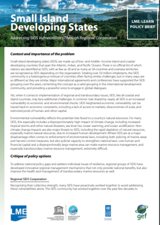 Small Island Developing States: Addressing SIDS Vulnerabilities Through Regional Cooperation
Small Island Developing States: Addressing SIDS Vulnerabilities Through Regional Cooperation
When it comes to implementation of regional and transboundary issues, Small Island Developing States (SIDS), like all coastal and island countries, may face additional challenges. A common trait sh...

























